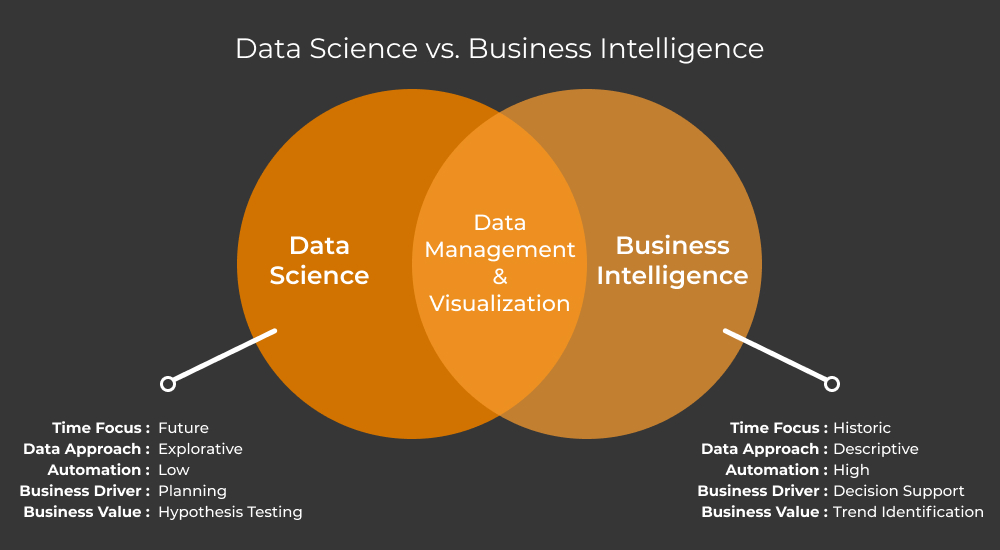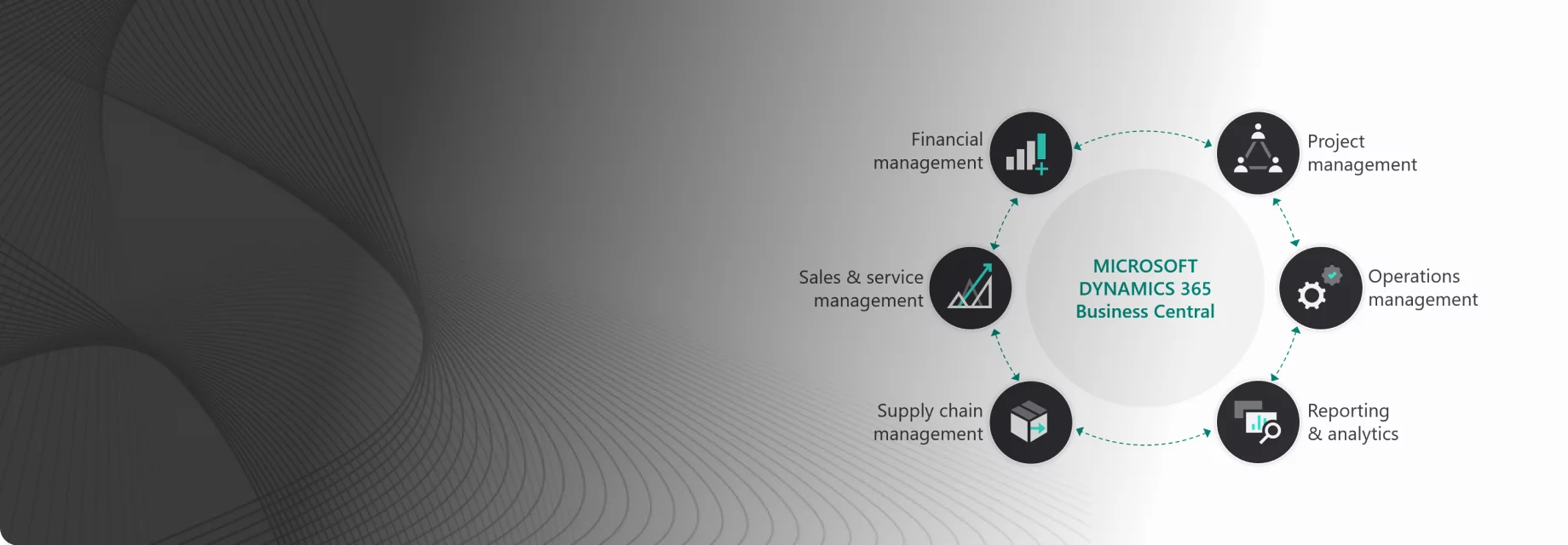Businesses are just getting into disruptive technologies such as Artificial Intelligence, Data Science, Blockchain, etc. Early adoption, however, isn’t easy, and most new projects do not progress beyond the proof of concept phase. This failure rate is high because of the novelty of technologies applied. Data Science is new; it needs fresh requirements and collaborations into a conventional corporate environment. Complications caused by novelties are hard to predict. A better understanding of new technology before project conception and implementation is needed.
Understanding Business Intelligence
What is Business Intelligence? According to Gartner, Business intelligence is “an umbrella term that includes the applications, infrastructure and tools, and best practices that enable access to and analysis of information to improve and optimize decisions and performance.” It is a concept that describes ideas and methods to enhance business decision making using a fact-based support system. Business Intelligence today doesn’t just provide business reporting – it is a smart system providing interactive dashboards, analytics, contingency planning as well as control over-reporting, etc.
Being a rather comprehensive concept- BI means different to different companies. For some, business intelligence is used as a KPI- a key performance indicator reporting on all modules of infrastructure; meanwhile, others may use advanced predictive methods based on a statistical model and advanced tools.
What are the organizational benefits of using Business Intelligence?
BI helps companies make better decisions by showing them present and historical data within their business context. Analysts can then leverage the business intelligence to provide competitor and performance benchmarks to transform organizations’ operations to run more smoothly. BI facilitates in-depth real-time insights into customers, quickly answers critical business questions, reduce time spent on data entry, as well as, identify/examine areas where cost-cutting and budget allocation is needed. Business Intelligence boosts the internal productivity of a company by giving directions on what points need more time and effort.
How do I know when my company needs Business Intelligence?
All organizations can benefit from business intelligence. Although, there are some clear indicators when your business needs BI technology. Like for e.g. –
- If your company lacks visibility to its own operations, news, finances and other metrics
- If there is a need to integrate data from various data sources and business applications
- If there is a pending merger or acquisition or if the company is experiencing rapid growth
- Due to the introduction of new products or services
- If there are new upgrades within the company IT infrastructure
- If there is an increased need for quick access to relevant business data and the growing number of end-users requiring access to information and analytical capabilities.
Organizations have found that allowing employees to access and track analytical and operational data improves work efficiency by monitoring real-time efforts side by side to the business plan.
The best of Business Intelligence Tools
There are great business intelligence tools available in the market to consider. Before you choose, though, here are some aspects that you should consider-
Compatibility – Many business intelligence tools are not complete, end-to-end solutions. Many companies need to buy BI software from multiple vendors. If your company needs aren’t fulfilled with a single product then you must ask the vendor about integration and compatibilities with other software.
Usability – some business intelligence tools are highly complex and offer increased customization-which can be difficult for non-technical users. You should consider the technical ability of the staff that will be utilizing the BI tools if you are going to need more complex features.
Scalability – there are BI tools that don’t scale as well as data needs grow. Therefore, you need to consider the range of the data generated by your organization and decide if the amount will stay the same or surge. If the data increases you have to make sure to choose a business intelligence tool that can handle the expected growth.
Each of the below BI product is dashboard-focused targeted towards SMEs and large enterprises.
Best Business Intelligence Software– Power BI v/s Tableau v/s Qlik
Microsoft’s Power BI
“Power BI,” as per Microsoft, “is a business analytics solution that lets you visualize your data and share insights across your organization, or embed them in your app or website.” It is a suite of business intelligence- data visualization products and services. Power BI also includes advanced features such as artificial intelligence and machine learning. Plus, it is integrated with Microsoft’s digital assistant Cortana.
Tableau
Tableau is a platform for data analytics and visualization. It has drag and drop capabilities and multiple data source connections that make it a popular choice among business intelligence users.
Qlik
Qlik is a self-service business intelligence solution that is similar to Tableau. Qlik software helps business users to find and share insights with their co-workers.
Which is the better business intelligence tool – Power BI v/s Tableau v/s Qlik
In terms of visualizations and dashboards
Microsoft Power BI is a very user-friendly solution with a drag and drop feature interface and includes access to more than 85 applications for data visualizations. Thanks to it being a Microsoft product, the Power BI’s interface and functionality is familiar to anyone using MS Excel spreadsheets.
Tableau is strong at data visualization concepts and is easy to use. Like Power BI it has a drag and drop interface that is both user-friendly and highly dynamic- permitting employees to easily connect to multiple data sources without deep-technical knowledge.
Qlik offers robust visualization features, although not as capable as Power BI or Tableau. The most particular aspect of this business intelligence tool is that it has an in-memory engine that offers significant performance enhancements and it can scale to perform with different data sources.
In terms of Analytics
The insights analytics offer is essential for business growth- regardless of the companies’ size. Self-service platforms like Power BI, Tableau and Qlik make this possible without continuous dependence on IT support. All three tools here are strong contenders when it comes to pure analytical capability- each one of standing out in their own unique way –
Power BI comes with features for data discovery, data preparation and building real-time interactive dashboards. Power BI is specifically suited for working with Excel spreadsheets as well as with other Microsoft applications.
Tableau chiefly focuses on visual analytics but includes more advanced features like data federation.
Qlik uses ETL processes to speedily connect SQL data in various files and formats.
In terms of Integrations
Power BI is an excellent tool when it comes to integrations with diverse data sources. If you are a Power BI user there are dozens of potential data sources available for you- with more being added as we write.
Some of the few sources on the list are – SQL databases, Microsoft Excel, XML & JSON files, Google Analytics, Mail Chimp, Salesforce, Marketo, Facebook, Spark, Hadoop, R Scripts and Python Scripts.
Meanwhile, Tableau and Qlik also are strong in data integrations- both of them have support for different APIs and connectors- you can seamlessly integrate the software with other tools and data.
In terms of Cloud Capability
Power BI, being a Microsoft product is compatible with Microsoft Azure- which offers cloud software called “Cloud-first”. If you want to take advantage of its cloud capabilities on a desktop then you need to have a cloud account to share visualizations and insights on the cloud.
Tableau is compatible with robust cloud platforms like AWS and Azure etc. You can use Tableau’s cloud capabilities via a third-party cloud platform or Tableau managed cloud system.
Qlik offers a SaaS cloud product- most users have a preference for the server version, however.
Now that we’ve established what BI is and what it does let’s find out why people confuse data science with business intelligence and how they distinguish from each other.
Why Data Science and Business Intelligence are used interchangeably?
So, how does Data Science differentiate from BI? Well, if you look at from the business perspective- you won’t see much difference between data science and business intelligence- because they both support business decisions by providing needed data. Probably this is why when starting new projects, data science seems as same as business intelligence. From this hypothesis, it is expected that a data science project can be executed on the existing business intelligence infrastructure.
This is where problems begin- the existing business processes and policies cannot support what a data scientist wants from the data as they use different libraries and software. So if business intelligence is essentially the same as data science, then why and how are the new requirements challenging for companies wanting to shift from BI to data science project?
What is the difference between Data Science and Business Intelligence?

To understand the fundamental difference between both concepts, one has to change the perspective it’s looked at, this means changing the type of question they address.
Business Intelligence helps monitor the current state of business information to understand the past performance of a business. It uses an available formula to provide new values for historically known factors.
Meanwhile, Data Science is made up of different interdisciplinary sciences applied together to generate new insights from available business data. Data science uses no formula- generating data that has never been answered before.
Summarizing, BI helps interpret historical data; and, data science examines the historical data to make future predictions. BI is used for Descriptive Analysis, and Data Science is used for Predictive Analysis.
Data Scientists v/s Business Intelligence Analysts
BI analyst’s main job is to find trends and patterns in your company’s past data. They focus more on the “what” rather than “why.” A BI analyst typically uses software like business intelligence dashboards, which makes visualizing business easier. They use programming languages like SQL to manage data and query databases. BI analysts use these tools to evaluate certain events on a company’s bottom line or compare an organization’s performance to that of other organizations in the same industry.
On the other hand, Data scientists have a tool-kit of algorithms to use for understanding and predicting a business’s performance. To gain such understanding, a data scientist needs more skill set based on machine learning, statistics, and programming. In addition to being skilled in languages like SQL- a data scientist also need to know languages designed for mathematical analysis like Python, Scala, and R, etc. A data scientist uses these programming languages to create a framework to leverage past data and the current data that is being generated to predict information like, for e.g., how much a company’s customers will spend over a period of time or when a set of the customer will change to competitors etc.
This framework is called a model that uses AI- specifically, machine learning to identify relationships between different features like a demographic age and average order value to predict how much a particular client is willing to spend. This model is constantly updated with new data, so the future outcomes and predictions stay relevant and accurate- this is something that a data scientist (not a BI analyst) is tasked to monitor.
Data Science and Business Intelligence work best together!
One of the biggest technological challenges faced by enterprises today is the increasing growth of allied technologies- which used together- have the ability to bring complete digital transformation in businesses. Both business intelligence and data science work towards understanding the market and business trends using large volumes of data; however, Business Intelligence, is the first logical step towards dabbling in data science. While, if you have a BI team in place collecting large amounts of data, data science can help you predict the future of your business- assisting you in refining your products/services and scale your operations. Either way, both data science and business intelligence have an essential place in your business.










